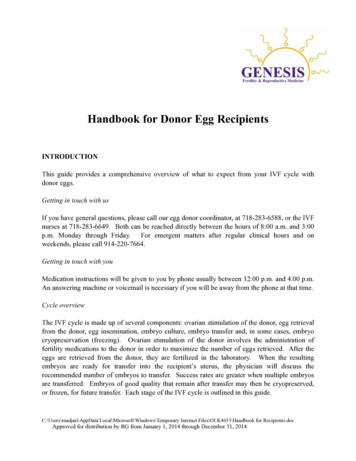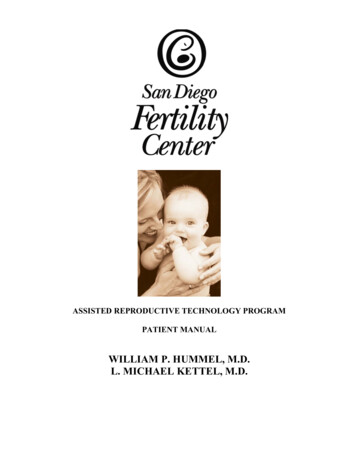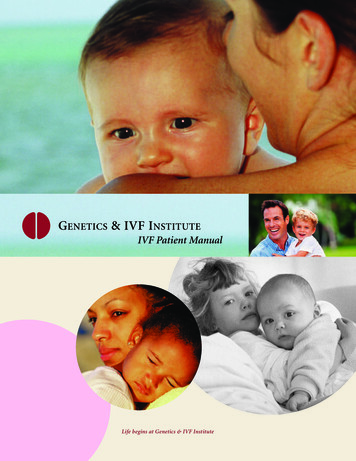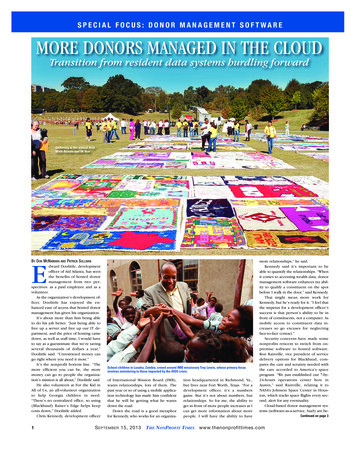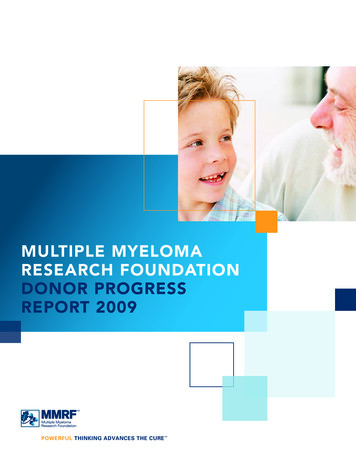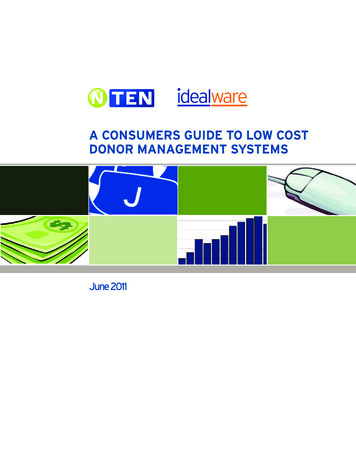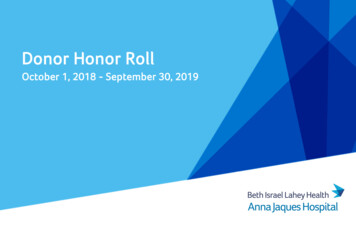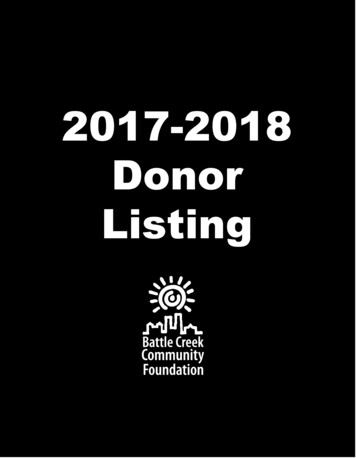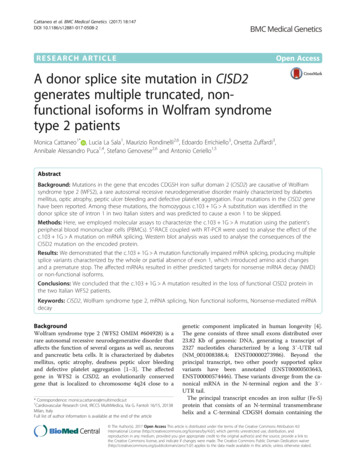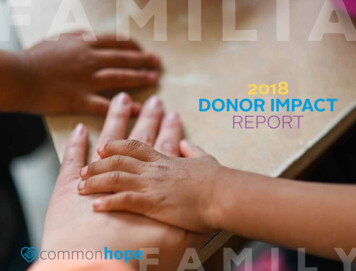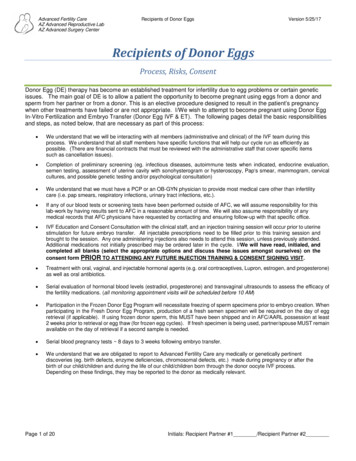
Transcription
Advanced Fertility CareAZ Advanced Reproductive LabAZ Advanced Surgery CenterRecipients of Donor EggsVersion 5/25/17Recipients of Donor EggsProcess, Risks, ConsentDonor Egg (DE) therapy has become an established treatment for infertility due to egg problems or certain geneticissues. The main goal of DE is to allow a patient the opportunity to become pregnant using eggs from a donor andsperm from her partner or from a donor. This is an elective procedure designed to result in the patient’s pregnancywhen other treatments have failed or are not appropriate. I/We wish to attempt to become pregnant using Donor EggIn-Vitro Fertilization and Embryo Transfer (Donor Egg IVF & ET). The following pages detail the basic responsibilitiesand steps, as noted below, that are necessary as part of this process: We understand that we will be interacting with all members (administrative and clinical) of the IVF team during thisprocess. We understand that all staff members have specific functions that will help our cycle run as efficiently aspossible. (There are financial contracts that must be reviewed with the administrative staff that cover specific itemssuch as cancellation issues). Completion of preliminary screening (eg. infectious diseases, autoimmune tests when indicated, endocrine evaluation,semen testing, assessment of uterine cavity with sonohysterogram or hysteroscopy, Pap‘s smear, mammogram, cervicalcultures, and possible genetic testing and/or psychological consultation) We understand that we must have a PCP or an OB-GYN physician to provide most medical care other than infertilitycare (i.e. pap smears, respiratory infections, urinary tract infections, etc.). If any of our blood tests or screening tests have been performed outside of AFC, we will assume responsibility for thislab-work by having results sent to AFC in a reasonable amount of time. We will also assume responsibility of anymedical records that AFC physicians have requested by contacting and ensuring follow-up with that specific office. IVF Education and Consent Consultation with the clinical staff, and an injection training session will occur prior to uterinestimulation for future embryo transfer. All injectable prescriptions need to be filled prior to this training session andbrought to the session. Any one administering injections also needs to attend this session, unless previously attended.Additional medications not initially prescribed may be ordered later in the cycle. I/We will have read, initialed, andcompleted all blanks (select the appropriate options and discuss these issues amongst ourselves) on theconsent form PRIOR TO ATTENDING ANY FUTURE INJECTION TRAINING & CONSENT SIGNING VISIT. Treatment with oral, vaginal, and injectable hormonal agents (e.g. oral contraceptives, Lupron, estrogen, and progesterone)as well as oral antibiotics. Serial evaluation of hormonal blood levels (estradiol, progesterone) and transvaginal ultrasounds to assess the efficacy ofthe fertility medications. (all monitoring appointment visits will be scheduled before 10 AM) Participation in the Frozen Donor Egg Program will necessitate freezing of sperm specimens prior to embryo creation. Whenparticipating in the Fresh Donor Egg Program, production of a fresh semen specimen will be required on the day of eggretrieval (if applicable). If using frozen donor sperm, this MUST have been shipped and in AFC/AARL possession at least2 weeks prior to retrieval or egg thaw (for frozen egg cycles). If fresh specimen is being used, partner/spouse MUST remainavailable on the day of retrieval if a second sample is needed. Serial blood pregnancy tests 8 days to 3 weeks following embryo transfer. We understand that we are obligated to report to Advanced Fertility Care any medically or genetically pertinentdiscoveries (eg. birth defects, enzyme deficiencies, chromosomal defects, etc.) made during pregnancy or after thebirth of our child/children and during the life of our child/children born through the donor oocyte IVF process.Depending on these findings, they may be reported to the donor as medically relevant.Page 1 of 20Initials: Recipient Partner #1 /Recipient Partner #2
Advanced Fertility CareAZ Advanced Reproductive LabAZ Advanced Surgery CenterRecipients of Donor EggsVersion 5/25/17Steps in the ProcessPreliminary Screening of RecipientI/We understand that there will be required preliminary screening for both partners. This may include femalescreening for infectious diseases (i.e. HIV, Hepatitis, Syphilis, Chlamydia, Mycoplasma, Ureaplasma), autoimmunedisorders, and basic hormones. Also a mammogram, Pap smear, and age appropriate primary care clearancemay also be required. In addition, uterine evaluation will be required and potentially a mock cycle may be requiredonly for fresh donor egg cycles prior to the donor starting injection medication. Estrogen and Progesteronemedications will be used to prepare for this mock cycle. Required testing of the recipient may include evaluation ofthe fallopian tubes for evidence of fluid dilation, of the uterus for adequacy of the endometrial lining, and ofessential blood hormone levels. Additional testing may need to be performed as deemed medically necessary byyour physician.Male screening will include screening for infectious diseases, blood type (if unknwon), and genetic carrierscreening, and possible additional hormonal and genetic testing as may be deemed necessary. Male screeningincludes a semen analysis unless donor sperm is to be used. We understand that all required preliminaryscreening labs must be completed before the donor selection occurs.Screening of Egg DonorDonor Screening. Egg donors will have their medical, psychological, genetic and family history recorded andscreened. Part of this screening is federally mandated (by the FDA), but most is based on regularly updatedguidelines issued by the American Society for Reproductive Medicine, and will also include, but not limited to hormonalscreening and urine drug screening. Should any additional testing be requested by the Recipients or necessary basedon the Recipient’s medical or family history, the Recipient(s) will be responsible for any additional expenses other thanthe cost of the standard preliminary tests.History, exam, or labs may not reveal an unknown random carrier status. There may be a risk of diseaseinherited from the donor, which may not have been evident through the standard screening procedures ofAdvanced Fertility Care (“AFC”). The donor like any other healthy female has the same risk of being a carrier ofan unknown condition, which she could transmit to the newborn. However, the risk of inherited disease is notincreased with oocyte donation.AFC cannot provide assurances of the accuracy of the medical histories supplied by the oocyte donor. Noscreening or testing regimen is perfect, so it is possible for children with major congenital malformations (birthdefects) or health problems to occur despite appropriate screening. AFC does not guarantee any characteristics ofa child resulting from the egg donation process, including, but not limited to, gender, blood type, eye color, haircolor, height or intellectual ability.Infectious Disease Testing Of The Egg Donor. The donor must have federally mandated infectious disease testingwithin 30 days of the egg retrieval. Unless these test results are available prior to the embryo transfer, the embryotransfer cannot take place and all of the eggs or embryos must be frozen for use and/or transfer at a time when theresults are available. If the anonymous donor tests positive for any of the infectious diseases as mandated by federallaw, the donor is considered ineligible and the eggs or embryos must be disposed of according to American Society forReproductive Medicine (“ASRM”) Ethical Guidelines.All donors are screened and/or tested for infectious diseases including HIV (the virus responsible for AIDS), syphilis,hepatitis (types B and C), gonorrhea, and chlamydia as mandated by federal law. Even with this screening, it ispossible that an infectious disease could be transmitted to a child conceived with the donated eggs or to the womanwho will carry the pregnancy.Page 2 of 20Initials: Recipient Partner #1 /Recipient Partner #2
Advanced Fertility CareAZ Advanced Reproductive LabAZ Advanced Surgery CenterRecipients of Donor EggsVersion 5/25/17Donor Selection and Program SelectionAs part of the donor selection process, a suitable egg donor will need to be identified first. Depending on availability, insome cases the donor will be able to provide fresh eggs. In the majority of cases, a donor’s eggs will already be frozenand stored in an Egg Bank. All donors must pass screening before any of their eggs can be used. Donor Selection and Payment of Fees: I/We will choose to use an eligible (as determined by AFCphysicians) known donor or more commonly, an unknown “anonymous” donor selected from AFC’s donorprogram or another approved donor agency. Once the type of donor cycle AND donor has been selected,a schedule will be developed for embryo creation and future embryo transfer. If the donor eggs arealready in an Egg Bank (Frozen Egg Cycle), depending on which type of frozen donor cycle is selected,embryo creation will usually occur within 6 weeks after full payment for the cycle is made. In many cases,sperm collection and freezing will also be required prior to creation of embryos by the AARL lab. In mostcases, the embryo transfer can often occur within a few weeks of donor selection for fresh cycles or afterembryo creation for frozen egg cycles. If the donor needs to undergo ovarian stimulation to produce theeggs (Fresh Cycle), additional time will be needed, and synchronization of the donor’s cycle and therecipient’s cycle is usually necessary.Payment of deposit (for Fresh Donor Egg Cycle) or payment in full (for Frozen Donor Egg Cycle) is due at theDonor Egg IVF Consent consultation which MUST occur within 5 business days of submission of the DONOREGG SELECTION FORM. Medications: I/We understand that ONLY medications for the DONOR are included in the cost of the freshdonor egg cycle, if the donor selected is from the AFC Donor Program. The donor will receive the medicationsat AFC. Medication costs are NOT included for non-AFC egg donors. Injection Training & Consent Consultation with Full Payment: I/We understand that I/we will attendthe REQUIRED injection training appointment in preparation for an embryo transfer. If the partner/spousewill not be giving the injections, the support person who will be giving injections MUST also be present atthis visit. In the case of fresh embryo transfers, this visit will be scheduled once all preliminaryrequirements have been completed, after the donor has passed her preliminary requirements, and beforeany treatment medications are initiated for either the donor or recipient. This consultation includes areview of medications, treatments, procedures, and includes the signing of clinical consents. Full paymentfor the cycle is due prior to or at the time of this visit unless prior arrangements have been made with thebilling office. Synchronization of menstrual cycle: Synchronization of the cycles will be accomplished with acombination of possible birth control pills and Lupron. Possible side effects of these medications includebut are not limited to hot flashes, headaches, insomnia, mood changes, weight gain, and fatigue.Page 3 of 20Initials: Recipient Partner #1 /Recipient Partner #2
Advanced Fertility CareAZ Advanced Reproductive LabAZ Advanced Surgery CenterRecipients of Donor EggsVersion 5/25/17Ovarian Stimulation of Donor to Obtain Eggs Injections of the natural hormones FSH and/or LH (gonadotropins) are used to cause a group of eggs todevelop to maturity in the donor.Additional medications are used to prevent premature ovulation.An overly vigorous ovarian response can occur, or conversely an inadequate response. Medications are used to stimulate the ovary in hopes of inducing the simultaneous growth of several oocytes(eggs) over the span of 8 or more days. Monitoring of the donor’s ovarian response by ultrasound is important. Atypical pattern of office visits is shown below:Preparatory CycleOffice visits:Ovarian Stimulation Cycle EggRetrieval This process does not cause the donor to run out of eggs sooner in the future. The eggs that are induced to growby these medications were already “linked” to this cycle and would have died anyway had they not been induced togrow.Preparation of the Recipient’s Uterus for Embryo Transfer Successful attachment of embryo(s) to the uterine lining depends on adequate hormonal support.Estrogen and Progesterone, given by the intramuscular, transdermal, oral, and/or vaginal route, isroutinely given for this purpose.Medications for Hormonal Support of the Uterine LiningSuccessful attachment of embryos to the uterine lining (endometrium) depends on adequate hormonal support of thelining. Estrogen agents,(i.e. oral or vaginal pills, transdermal patches, injections), and Progesterone agents, (i.e.injections, lozenges, and vaginal suppositories) will be used to prepare and support the uterine lining for embryotransfer. Estrogen will be started approximately 1 to 3 weeks after starting Lupron. Progesterone will be startedaround the day of the donor’s egg retrieval and continued until the pregnancy test. The duration of this support is from2 to 10 weeks. Possible side effects of these medications include but are not limited to headaches, lower abdominalpain, breast tenderness, mood changes, weight gain, and undocumented possible future risks such as estrogendependent cancer. The medical literature to date has not supported any risk of cancers with this therapy. Serialtransvaginal ultrasounds and blood estradiol levels will be done throughout the cycle to assess the adequateabsorption of the medication and ensure the satisfactory preparation of the endometr
In-Vitro Fertilization and Embryo Transfer (Donor Egg IVF & ET). The following pages detail the basic responsibilities and steps, as noted below, that are necessary as part of this process: We understand that we will be interacting with all members (administrative and clinical) of the IVF team during this process. We understand that all staff members have specific functions that will help .
